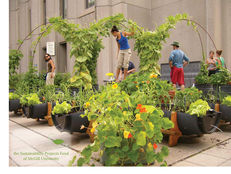Catalyzing a culture of sustainability at McGill University with the Sustainability Projects Fund (SPF)
The Sustainability Projects Fund (SPF) is a crown jewel of McGill University’s sustainability efforts and a best-practice model for universities. The SPF’s main goal is to build a culture of sustainability on McGill’s campuses through the development and seed-funding of interdisciplinary projects.
With an annual value of CAD 885,000 in 2016, the SPF is the largest dedicated campus sustainability fund of its kind in North America among McGill peer institutions, and is uniquely committed to collaboration between students and staff in its financing, decision-making, and project implementation.
Since its creation in 2010, the Fund has awarded over $5 million to 155 projects, which have yielded dramatic and lasting improvements to McGill’s social, economic, and environmental sustainability performance. Every significant sustainability achievement at McGill over the past several years, from local and sustainable food sourcing to emissions reduction to Aboriginal engagement, has been facilitated to some degree by SPF funding.
Top 3 learnings
1. Nurture engagement. We learned to empower and leverage our most invested and passionate individuals to bring ideas into reality. This included developing tools and communicating transparent and participatory processes.
2. Be unafraid. We learned to ask ‘why not?’ instead of ‘why’, allowing SPF projects to embody McGill’s sustainability ethos of ambitious realism. We choose to learn from failures instead of shying away from them and use campus as a living laboratory where knowledge is applied and learning is experiential.
3. Create a community. Instead of taking ownership of all projects, we learned to play a facilitator role, bringing together diverse persons who would normally not work together, distributing leadership, and helping them share and celebrate their successes.
What it means to win
“McGill students, in collaboration with staff and faculty, have always been catalysts of change and innovation on our campuses. Winning the GUPES Green Gown Award will be a testament to what is possible when we encourage these partnerships and harness their potential to make a more sustainable
world.”
Principal and Vice-Chancellor Suzanne Fortier
Videos









 Except where otherwise stated, content on this site is
licensed under a Creative Commons Attribution 3.0 License.
Except where otherwise stated, content on this site is
licensed under a Creative Commons Attribution 3.0 License.
